How Chinese People Think about Love and Marriage
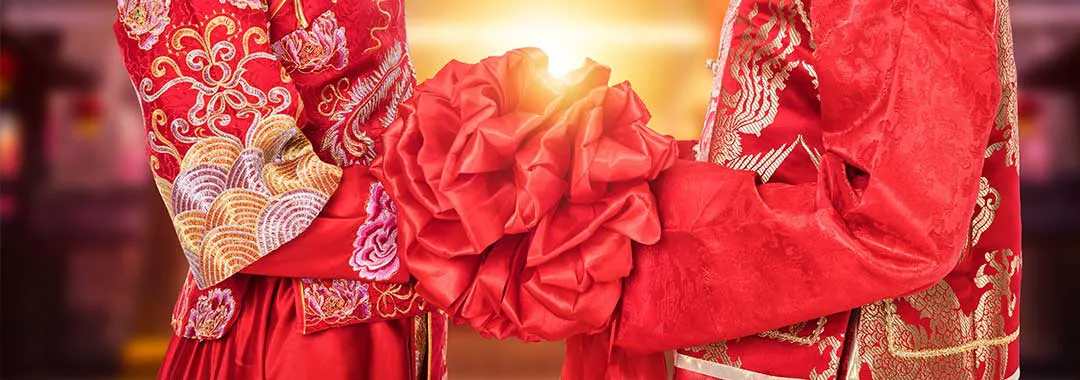
There’s an old Frank Sinatra song that says:
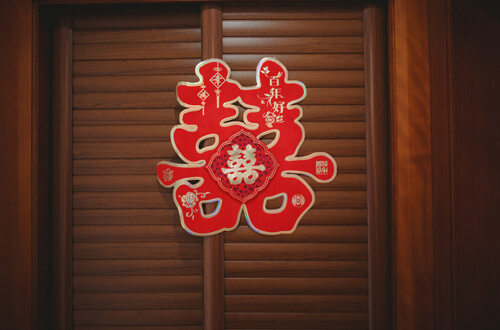
“Love and marriage, love and marriage,
Go together like a horse and carriage.
This I tell you brother
You can’t have one without the other.”
For those that may be too young to remember the song, it still expresses the Western ideal that love and marriage must be irrevocably linked. This convention is so deep-seated that many westerners are scandalized by any civilization that does not embrace the ideal.
Do Chinese Couples Marry for Love?
In China, there are more important things in life than love, or even happiness. This is encapsulated in the widely repeated comment by a young lady on the Chinese dating show “You are the one” in 2010:
“I would rather cry in a BMW than smile on a bicycle.”

Economic considerations, and the ability to care for elderly parents, weigh much more heavily than love or even happiness. That does not mean that young people would not like to marry for love, if they could, and of course some are lucky enough to get both.
The Marriage Laws (1950 and 1980) gave women equality, and also outlawed polygamy, child marriages and arranged marriages. The laws even reiterated free choice of marriage partners without third party interference.
Despite this, even today Chinese parents continue to hold sway over their young adult child as they set out to choose a marriage partner. It is imperative for the young man or young woman to make the right decision because it will affect not only the rest of their life, but also the well-being of their parents and grandparents.
Not surprisingly, a considerable amount of match-making in one form or another still goes on to help them make the best choice.
What Are the Most Important Attributes of a Good Husband or Wife?
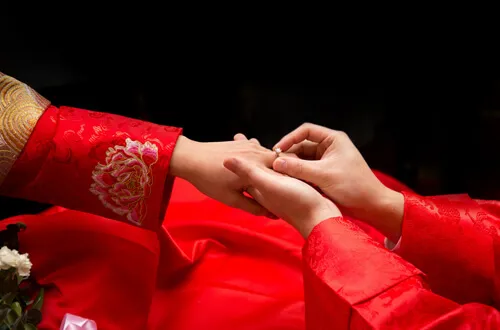
Firstly, it is considered important that the husband and wife come from similar social status, as it is believed that a mismatch here is bound to end in failure.
It’s ok for adolescents to have feelings of love, but when they reach marriageable age then love is thought to be not only unnecessary, but probably even dangerous. More useful and important to prepare for choosing a spouse would be a good education, having a job, and maybe owning a flat.
For a good match, the man must be older than the girl, and he must earn more than she does. Despite not expecting to “fall in love”, physical appearance is also of considerable importance. Being attractive and well-groomed will influence job potential and future prospects, and, along with mannerisms and posture, are good indications of worthy attitudes and character.
How Do Chinese People Choose a Husband or Wife?
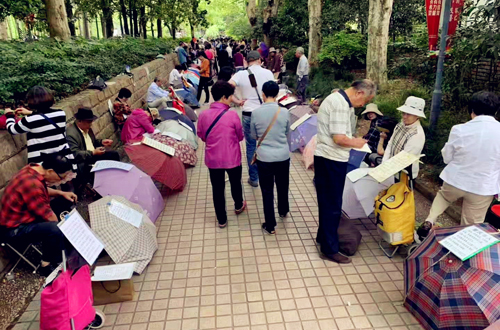 Marriage Market in Shanghai People's Park
Marriage Market in Shanghai People's Park
Rather than actual arranged marriages, Chinese parents have long engaged in matchmaking, thus improving the chance of a suitable match rather than just waiting for love and romance to blossom. A popular form of modern matchmaking is with Chinese Marriage Markets, (or Bai Fa Xiang Qin). This is an opportunity for parents to advertise their child with information about their age, height, job, income, education, Chinese zodiac sign, personality, family values, and even a picture. Sometimes they also include specific requirements for a suitable match.
Of course, not all young people are happy for their parents to be doing this, and so it is often done secretly without telling the children. The parents first hope to meet with the prospective in-laws to get an indication of what the child is really like, and this hopefully leads to their offspring dating and eventually to a successful match. Despite the rising popularity of these markets with the parents, they actually have a fairly low success rate.
Moreover, arranged meetings or blind dates remain a popular means of dating for young people aiming to find their amorous partner. The middleman serves as an intermediary and facilitates the first meeting, which can include activities such as watching movies or scheduling visits, leading to further interaction if both parties are mutually satisfied.
With the rise of technology and social media, online dating apps have become increasingly popular in China. Many young people use dating apps and websites to meet potential partners. In cases where individuals are less social, the availability of choices may be limited, however, dating software provides some remedy for this inadequacy. As online dating continues to gain ground in China, several dating apps and platforms have emerged to assist those seeking romance. The top 5 apps used include Momo, Soul, Tantan, Zhenai and Baihe App.
Why Do Chinese Young People Delay Getting Married?
The "China Census Yearbook-2020" reported that the average age of first marriage for Chinese individuals has increased to 28.67 years old, with men averaging 29.38 years old and women at 27.95 years old.

There are several reasons why Chinese youth are delaying marriage.
Firstly, the level of education has improved, resulting in more people choosing to study postgraduate or doctorate programs, particularly women. This has led to a longer period of educational attainment, naturally pushing back the age at which people get married.
Secondly, fierce social competition and high employment pressure, combined with an accelerated pace of work and life, leave many young people too busy for dating. Long work hours and infrequent interactions with the opposite sex have reduced opportunities for romantic encounters.
Thirdly, the cost of marriage has increased sharply in recent years, particularly with rising housing prices and bride prices across rural and urban areas. Marriage preparation time has also been prolonged in first-tier cities where wedding costs remain particularly high. This has made it difficult for individuals to afford getting married.
Lastly, modern ideas about marriage have led many young people to prioritize independent choice and quality of marriage over societal expectations. They take comfort in living independently and may have a smaller family structure than previously, and they do not always consider marriage to be the only path towards love. This shift in mindset has also contributed to the delay of marriage for some Chinese youth.
Do Chinese Couples Live Together Before Marriage?
According to a survey, over 70% of people believe that cohabitation before marriage can have a positive impact on intimate relationships in both the short and long term. This includes benefits such as improving mutual understanding, adapting to living habits, and facilitating smoother and more effective communication. Additionally, 6.22% of respondents reported feeling more confident in their future marriage as a result of cohabitation. However, there are also negative impacts to consider. The main concerns include a potential loss of freshness in the relationship, a decrease in personal privacy, and a decrease in sex appeal.

Traditionally, cohabitation before marriage was not common in Chinese culture due to the influence of Confucianism and the emphasis on family values and morality. However, with the increasing modernization and Westernization of Chinese society, cohabitation before marriage is becoming more common, especially among younger generations in urban areas.
According to a survey conducted by the Chinese Marriage and Family Counseling Center in 2019, around 70% of young Chinese people in cities have lived together with their partners before marriage. This trend is more prevalent in larger cities where there is more exposure to Western culture and values.
However, it is important to note that cohabitation before marriage is still not widely accepted in some parts of China, particularly in more conservative rural areas. Additionally, parents and older generations may still hold traditional values and disapprove of cohabitation before marriage.
Nevertheless, while cohabitation before marriage is becoming more common in China, it is still a topic of debate and not universally accepted.
What is Dating Like in Chinese Culture?
Dating in Chinese culture can vary depending on the region and individual beliefs, but there are some general customs and traditions that are commonly followed.

Family involvement: In Chinese culture, family is highly valued and respected. It is common for parents to be involved in their children's dating lives and to have a say in who they date. Parents may even arrange blind dates for their children.
Group dating: In China, it is common for couples to go on group dates with friends. This is seen as a way to get to know each other in a more relaxed and social setting.
Gender roles: While traditional gender roles still exist in Chinese culture, there has been a shift towards more gender equality in dating. Women are now more likely to be financially independent and have more say in who they date and marry.
Marriage: Marriage is highly valued in Chinese culture, and dating is often seen as a precursor to marriage. It is not uncommon for couples to discuss marriage early on in the relationship.
Casual dating: In larger cities, casual dating is becoming more common among young people. This involves dating multiple people at once and not necessarily looking for a serious relationship.
PDA: Public displays of affection are not as common in Chinese culture as they are in Western cultures. Holding hands and hugging in public is generally acceptable, but kissing and other forms of physical affection are not as common.
Dating in China is evolving and becoming more diverse as the country modernizes and becomes more connected to the rest of the world.
Is It OK to Remain Single?
With an ever-increasing imbalance between the sexes, there are not enough girls to go around, so doubtless some men will be forced to remain single.
On the other hand, the expectation that women will be younger than their husbands, and earn less than them, can prove unworkable for those strong, intelligent young women who want to have a career, and the older they get, the less chance they have of getting married. And then, of course, if they do get married, they will be expected to put their career on hold to have one, or now two, children.
In the “4:2:1 family” (4 grandparents, 2 parents, 1 child) if the child does not marry then clearly this can become a problem for the aging parents and grandparents. Parents would prefer their offspring to marry, and to be wealthy and possibly happy as well.


 Privacy and Personal Space in China
Privacy and Personal Space in China 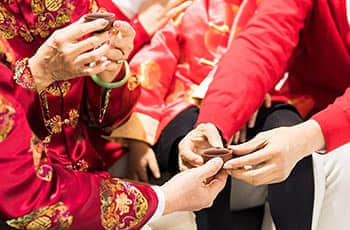 How Does the Chinese Interact with Tea?
How Does the Chinese Interact with Tea?  China's Birth Control
China's Birth Control  Why do Chinese people always talk so loudly?
Why do Chinese people always talk so loudly?